University of Suffolk NEWS
WELCOME
‘Standing at the gate of the year.’
In his Christmas broadcast in 1939 George VI quoted some words by (at the time) an unknown poet, that struck a chord with a country facing an uncertain future:
‘And I said to the man who stood at the gate of the year: “Give me a light that I may tread safely into the unknown.”
These words were in fact from an obscure poem, written in 1908 by Minnie Louise Haskins (18751957), a retired London School of Economics (LSE) academic. The poem was just a small part of a career which included working in India and the East End, industrial welfare and academia.
At the age of 43 she went to LSE to study Social Science. A long and distinguished academic career followed during which, Minnie Haskins played an important part in the establishment of the Institute of Industrial Welfare Workers, the forerunner of the Institute of Personnel Management, now the Chartered Institute of Personnel and Development (CIPD), and promoting ‘a spirit of co-operation’ between worker and employer. During this time, she continued to write, both novels and poetry, being described as ‘a woman of unusual capacity and character … [with] rare understanding and sympathy and infinite patience, combined with a great deal of love and interest in people.’ Finally retiring in 1944, Minnie Haskins died in 1957 but her now famous words on how to face the future without fear live on, inscribed at the entrance to the George
VI memorial chapel in St George’s Chapel, Windsor.
For many of us, if we had known what 2020 was going to bring, we may well have looked for a light that would have helped us tread safely into a year that has been full of the unknown and at times led us to be fearful.
One of the things that fascinates me about Minnie Haskins is not so much her poetry, but what she accomplished by embracing the unknown. Minnie cannot have known that her early and pioneering work in India and in the East End would in time lead to an enduring legacy that is the CIPD, an institute that continues to this day and influences academia and business alike.
Here at the University of Suffolk, as 2020 draws to a close, it would be easy to categorise this year as one of crisis and misfortune. Yet as I look at everything that this issue brings to our attention it is clear that 2020 will be a year that brings far reaching impact beyond what we ever envisaged and could have wished for. We have been innovative and creative; The Hold, the DigiTech Centre, online learning, successful conferences, new Continuing Professional Development (CPD) and postgraduate courses — the list is endless and demonstrates a thriving academic community, continuing its journey to long-term sustainability, playing its part in our community and beyond.

University of Suffolk NEWS Issue 9 2020 Page 1
Issue 9 - 2020
continued on next page
Minnie Haskins appears to have been a resounding success in her own right; yet she was also part of something bigger that gave her a platform and a voice to take her ideas forward.
As we individually and collectively stand at the gate of the end of 2020 and the beginning of 2021, let us not only celebrate the opportunities that 2020 has given us but also look forward to what 2021 will offer. As anyone who has walked out in the dark will know, using a torch or streetlight will enable us to see the immediate steps but does not always enable the whole path to be seen. 2021 stretches ahead of us; we have some light to be able to see how the year will start and more knowledge than before as to how challenging 2021 is likely to be, as we continue to work through the many impacts of the pandemic alongside the impact of Brexit – two huge and dominating contexts within which we live and work. And yet the core of our work does not change – we are here to provide education that transforms – individuals, communities and society more broadly.
So, I encourage you to be positive about 2021 – it is going to be a good year with many opportunities individually and collectively. Many of the initiatives in this issue are only just beginning and will continue to evolve and grow in 2021. Others will emerge and sit alongside, giving many the opportunity to engage, develop and grow alongside them. So be bold and innovative and embrace all that 2021 has to offer and, like Minnie Haskins, may people say of us that we have unusual capacity and character and, above all, an interest in people as we seek to take our mission forward and in a way that supports the individual to thrive within the context of the institution as a whole.
Professor Helen Langton Vice-Chancellor
UNIVERSITY OF SUFFOLK NOTABLE ACHIEVEMENTS 2020
BA (Hons) History was ranked third in the country in the Guardian University Guide 2021. Overall, the University climbed 22 places in the table.
In the National Student Survey, four courses scored 100%: BSc (Hons) Sport and Exercise Science, BSc (Hons) Bioscience, BA (Hons) Graphic Design and BA (Hons) History — the course has received top results since 2011.
The Times Higher Education Awards this year chose to recognise all admissions teams across the sector, including the University of Suffolk, for their outstanding work during the pandemic.
Issue 9 2020 University of Suffolk NEWS Page 2 Welcome continued WELCOME
Contents
Welcome 1
University of Suffolk Notable Achievements 2020 2
In focus 4
The Hold opens its doors 4
DigiTech Centre 5
EcoLab 6
Continuing Professional Development 6
News and updates 8
Suffolk Business School announced as a Founding Partner of the Institute of Event Management 8
Preparations for National Apprenticeship Week 8-14 February 2021 8 Senior positions appointed 9 SilverCloud 10
Sustainability Conference in partnership with the Royal Institute of British Architects 10
Student successes 11
Outstanding Nursing student shortlisted for Student of the Year Award 11 Award winning Fine Art graduate 12
Institute of Engineering and Technology — Student of the Year 12
Coronavirus and the University of Suffolk 13
Health students and academics supporting the national effort 13
Sustaining learning and teaching through COVID-19 14
First ever virtual open event held 14 We are Together with Business 15 3D Productivity Suite 16
Criminology students create distraction packs for prisoners 17 App to support communities launched with the help of the University 17 Recognition for the University’s response 18
Research and publications 19
Policing in the Era of AI and Smart Societies 19
Hidden Needs Report 20
Research and Public Engagement Conference 20
Augmented Reality and Health (ARHe project) 21
Articles from earlier this year 22
An increase in applications shows the impact of the University’s widening participation work 22
Q&A with Professor Gurpreet Jagpal, the recently appointed Pro Vice-Chancellor for Business Engagement and Entrepreneurship 23
Ed Sheeran: Made in Suffolk educational workshops 24
2020 Keio Study Programme 25
Events and Tourism students visit Spain 26
Biomedical Science accreditation 26
AWS Academy — equipping students for careers in cloud computing 27
Over to you 28
University of Suffolk NEWS Issue 9 2020 Page 3
IN FOCUS The Hold opens its doors
The Hold, the flagship new heritage facility for Suffolk located on the University’s campus, opened its doors to the public for the first time in the summer.
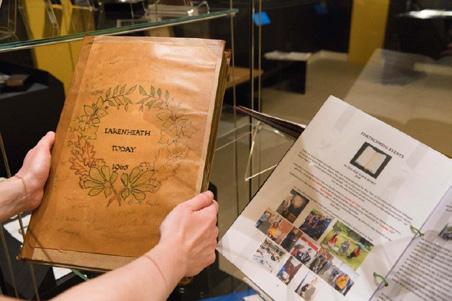
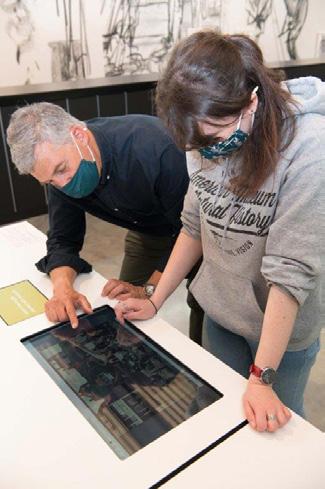
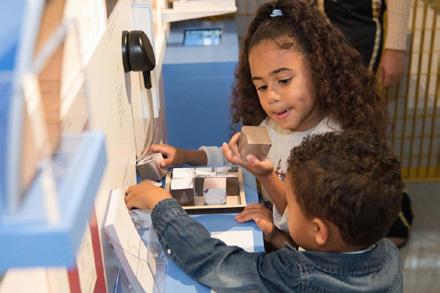
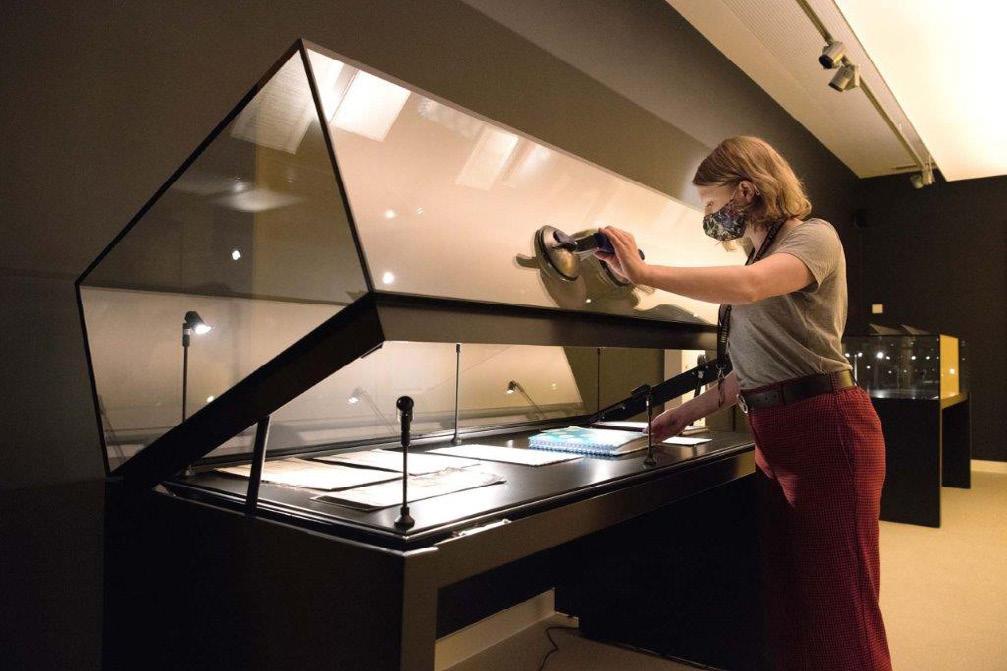
The new building is the permanent home of the Suffolk Archives Ipswich branch and is shared with the University; we have a dedicated space which includes a 200-seater auditorium and two seminar rooms.
Visitors will initially be able to access ‘front of house’ public areas; archive inspired displays, the cafe, shop, and toilets, including a new Changing Place facility.
The first exhibition called Global Events: Suffolk Stories is currently on display (COVIDrestrictions apply). Global Events examines how Suffolk has responded as a community to key global events over the past 100 years focusing on World War Two, and the ‘Friendly Invasion’ in particular, as well as the Cold War, and the more recent COVID-19 pandemic.
For more information please visit www.suffolkarchives.co.uk
Issue 9 2020 University of Suffolk NEWS Page 4
IN FOCUS
DigiTech Centre
The University of Suffolk’s new £9.6m digital skills training centre, the DigiTech Centre on BT’s Adastral Park, is nearing completion and will welcome students in February.
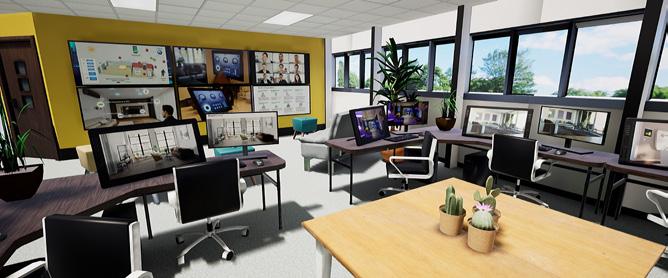
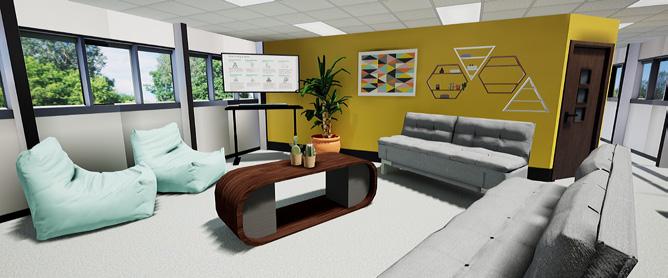
The phase one build project is now complete and the main location for the Centre, Oberon 1, has been handed over to the University for its fit out of furniture, workstations, networks, servers, and other specialist equipment.
The DigiTech Centre is a collaboration between the University and BT, with funding from the New Anglia Local Enterprise Partnership (LEP). It will provide training in cutting-edge digital skills for people looking to pursue careers in the nationallyimportant information and communications technology (ICT) sector, as well as fuelling high tech businesses who increasingly require access to a talented technology workforce.
Specialist high tech laboratories will form the heart of the new Centre, and will be used jointly by University staff, students and businesses at Adastral Park and across the region.
Professor Nicholas Caldwell, Professor of Information Systems Engineering, said, “It’s a joint initiative project that provides a 21st century centre for teaching digital skills and courses for the benefit of everyone in the region. It provides a venue not just for students who want to get degrees but also a venue for continuing professionals’ development or people who are already in employment.”
Once operational, the Centre will be used by around 500 students and 145 apprentices each year, with students splitting their time between Adastral Park and the Waterfront campus.
The University will be one of only a handful of universities globally to have the direct backing and link with one of the world’s top communications companies and it is set to help attract students from far afield. Already the MSc Data Science and Artificial Intelligence is seeing many applications from international students.
University of Suffolk NEWS Issue 9 2020 Page 5
IN FOCUS
EcoLab
The ‘EcoLab’ is a smart living research laboratory currently being developed by the University with BT.
Benjamin Powell, Lecturer in Architecture and Director of Studio Manifest is leading on the project. Studio Manifest approach low energy, sustainable and affordable architecture, as an opportunity — to design extraordinary spaces that improve our lives and are accessible and relevant to all.
Having been granted planning permission, construction of the EcoLab is due to commence in early 2021. The building takes the form of a twobedroom house and is designed to be built for a limited budget of approximately £200,000.
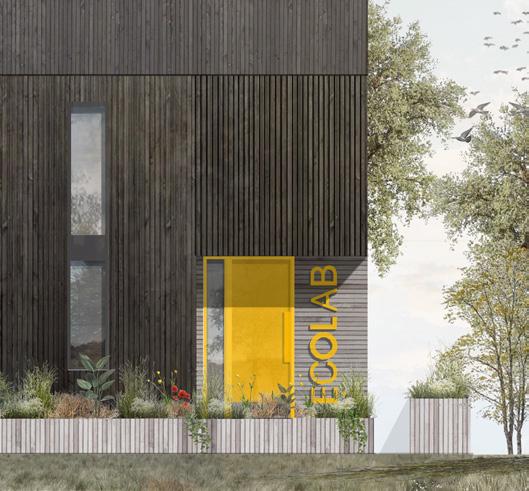
The initial targets for the project are: to achieve a Zero Carbon occupancy; a reduction in embodied carbon of around 50% compared to a typical brick and block house; and to construct the building using the latest construction methods.
In the longer term, the completed build will utilise SMART systems to evaluate the performance of sustainable materials, low carbon energy and water consumption, coupled with critical consideration of the wider landscape through ecological design.
The project brief is therefore to address two of the most pressing concerns that we face: climate change, and the impact the construction industry has on this; and the UK housing crisis, which sees the chronic shortage of affordable housing.
Continuing Professional Development
Debra Gingell Business Development Manager (CPD)
Return to social work
Supporting qualified Social Workers to return to professional practice in Suffolk.
The call:
Building on a trusted relationship, established through the Norfolk and Suffolk Teaching Partnership that has run successfully for three years, Suffolk County Council approached the University of Suffolk’s Social Work team, to co-produce a new CPD programme to support social workers to return to the profession.
The impetus for a Return to Social Work course was a way to address retention issues.
A recent study found four in ten social workers expect to leave the profession within five years (see more information).
The course comprises of ten days formal study, at least twenty four days supervised practice and private study to make up at least sixty days of knowledge and skills updating. This is the requirement of the professional body, Social Work England, where a qualified social worker has been out of practice for more than five years.
Nora Duckett (Social Work Course Lead) shares her experience:
The course was due to start just as the lockdown happened, but I was determined that the course would go on. Participants had prepared for it, no one was able to indicate
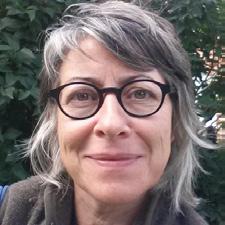
Issue 9 2020 University of Suffolk NEWS Page 6
when the restrictions would ease and social workers, like other key workers, were continuing their work and were rapidly adapting to the draconian circumstances. I saw this programme as an excellent way to draw qualified social workers back to the profession, to Suffolk specifically and to the communities where the work is needed.
As the programme got going, we found that using the virtual classroom and the Brightspace platform worked well. In fact, no one said that they didn’t like it and over 40% said that they preferred it.
Participants quickly jelled and established a peer support group. There was also a lot to cover in eight days and, as it was virtual, it needed to be as interactive as possible. I enlisted the help of University of Suffolk and University of Essex colleagues and significantly the participation of Social Work Voices — a group of individuals who have personal life experiences of social work services. This component was the ‘jewel in the crown’ of the programme because of the unique learning opportunity it afforded.
Despite the restrictions we were able to simulate a ‘real’ scenario: a telephone call with a ‘client’ who was struggling with the toxic combination of absolute poverty, deteriorating mental health and social isolation. Each participant was to offer telephone support to the individual, manage the conflict that ensued and accurately record the conversation. Both the conversation and the written record received ‘client’ feedback along with a re-telling of the emotional and psychological impact on the client of the things being said by the social worker.
This was a meaningful and powerful learning experience for everyone, and this is reflected in the following participant comment:
“Absolutely invaluable session. Best learning experience I have had academically ever in terms of preparing, engaging and then getting feedback about how the person concerned actually experiences my intended communication.”
Outcomes
Returning to social work after a period away is tough. Nora and the team delivered a programme of study to a cohort of social workers, to build their confidence and update their knowledge and skills in contemporary social work. Despite lockdown, participants were provided with supervised practice experience by Suffolk County Council. They are in the process of re-registering or applying for registration with Social Work England and one participant has successfully registered. All participants should be guaranteed an interview with Suffolk County Council. We wish them all well!
Loretta Greenacre, Workforce Development Manager at Suffolk County Council, says: “It has been a great collaboration for us to work with the University of Suffolk to pilot our own Return to Social Work programme. Our first cohort has been significantly impacted by the COVID-19 pandemic; however, we have worked creatively together to enable the programme to continue despite the challenges of lockdown.”
Martin Hines, Associate Dean, commented: “Nora has established a strong partnership with Suffolk County Council’s Social Work team. She has worked tirelessly throughout the COVID-19 pandemic to prepare an additional pool of suitably qualified and experienced social workers. By incorporating authentic experiential activities, alongside feedback from service users, each participant was enabled to update their knowledge and understanding and feel confident to return to this vital profession.”
A second course, building on learning from the first, is being planned.
I’d like to join the professional learners and shout out a resounding ‘WELL DONE’ and ‘THANK YOU’ to Nora and the team.
See PowerPoint ‘thank you’ that Nora received from learners.
The course has been a genuine success for all parties concerned!
University of Suffolk NEWS Issue 9 2020 Page 7
Continuing
IN FOCUS
Professional Development continued
Suffolk Business School announced as a Founding Partner of the Institute of Event Management
The Institute of Event Management has announced Suffolk Business School at the University of Suffolk as their Founding Partner. The Institute was established to provide an opportunity for individuals who already work or wish to work in the events sector to gain professional recognition, and to enhance their profile, skills and knowledge. It provides a route to professional recognition, to champion and develop the role of event professionals and raise awareness worldwide and will, in the near future, be accrediting qualifications based on professional standards.
Pro Vice-Chancellor for Business and Entrepreneurship, Professor Gurpreet Jagpal, said, “The partnership with the Institute of Event Management further strengthens the Suffolk Business School’s links with professional bodies and external businesses. Our students will benefit from a curriculum that is informed by current and projected trends in the sector, ensuring they are both knowledgeable and equipped with the right skills to adapt to an ever-changing world of work. I very much look forward to the School developing and growing this partnership over the next few years for the benefit of staff, students and the sector.”
Preparations for National Apprenticeship Week

8-14 February 2021
The Apprenticeship Hub are already making preparations for the 2021 National Apprenticeship Week which will be focusing on and recognising our apprentice students and their employers on the front line work they performed during COVID-19 whilst balancing their studies.
During the week commencing 8 February 2021 student profiles will be featured across the Apprenticeships section of our website and relevant social media platforms.
We would like to call on colleagues to nominate their students from the School of Health and Sport Sciences, the School of Social Sciences and Humanities, the School of Engineering, Arts, Science and Technology and Suffolk Business School.
Email your nominations to apprenticeships@uos.ac.uk
GOV.UK news: National Apprenticeship Week 2021 date announced
Issue 9 2020 University of Suffolk NEWS Page 8 NEWS AND UPDATES
NEWS AND UPDATES
Senior positions appointed
Two new senior posts have been appointed; the Dean of the School of Engineering, Arts, Science and Technology (EAST) and the Professor of Integrated Care and Director of the Integrated Care Academy.
Professor Alistair Mathie will take up the post of Dean of the School of EAST in January 2021. Professor Mathie is currently Deputy Dean of the Faculty of Sciences at the University of Kent.

Professor Chantal Ski has been appointed as the Professor of Integrated Care and Director of the new Integrated Care Academy.
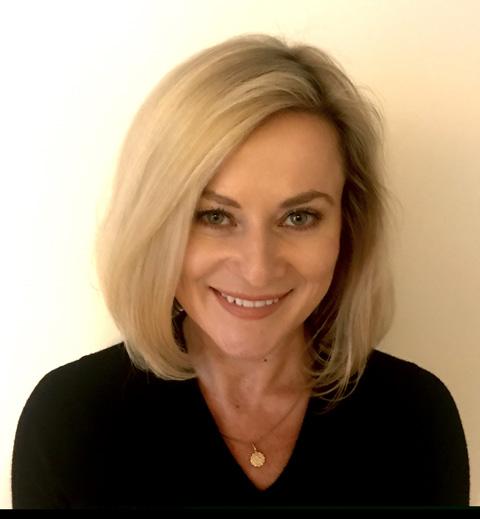
The University has formed a nationally unique alliance with St Elizabeth Hospice, Suffolk Mind and with local NHS Foundation Trusts. The Integrated Care Academy will support the longer term needs of the most vulnerable in our communities and future-proof our outstanding primary healthcare systems. The Academy, developed in partnership with NHS and Social Care employers and based at the University of Suffolk, will be the first of its kind in the country that will give local people an increased opportunity to be part of the local health and care workforce. It will also offer clinics in physiotherapy, counselling and psychotherapy, and sports massage and these will be accessible to the wider community in our town.
Professor Mohammad Dastbaz, Deputy Vice-Chancellor, said “We are delighted to have appointed Professor Mathie and Professor Ski. Both bring a wealth of experience and expertise to the University and their roles. Their appointments help us to progress our plans laid out in our ten-year strategy which will be published in the new year.”
University of Suffolk NEWS Issue 9 2020 Page 9
Photo of Professor Alistair Mathie courtesy of Medway School of Pharmacy
SilverCloud
The University has partnered with SilverCloud, a leading provider of digital mental and behavioural health programmes. Partnering with SilverCloud was an initiative suggested by the Students’ Union whose vision and collaboration has been key in bringing this to fruition.
The online, CBT-based (Cognitive Behavioural Therapy) wellbeing programmes for staff and
students include Space from COVID-19, Space from Stress, Space for Resilience, Space for Sleep and Space from Money Worries.
SilverCloud is just one addition to the University’s growing set of resources to promote positive wellbeing for both students and staff, enhancing the student experience and complementing our existing wellbeing and mental health programmes.
partnership with the Royal Institute of British Architects
Sustainability Conference in
The department of Architecture at the University of Suffolk and the Suffolk Sustainability Institute delivered the first international conference focused on the future of the built environment, presenting the Suffolk paradigm in September 2020 with great success. The event was called The Built Environment as Sustainable Ecosystem and ran as part of the Royal Institute of British Architects national initiative People-Place-Planet.
The event was organised by Dr Liana Psarologaki, architect and course leader for our BA (Hons) Architecture, who was elected in 2020 as the new Chair of Education for the RIBA East Region, overseeing education agendas supporting and representing around 1800 RIBA members, 500 students and 250 practices in Bedfordshire, Cambridgeshire, Essex, Hertfordshire, Suffolk and Norfolk.
The event presented a programme of visually rich talks, interactive debates and presentations with a focus on ecosystems, sustainability and the built environment. These spanned from strategic vision-to-vision to specific research projects that showcase integrative approaches for a sustainable life. The conference aimed to
enrich our collective understanding of some of the wider societal challenges of creating sustainable urban landscapes and buildings and invited delegates to explore how architectural and building practice have been evolving to meet these transitional needs. Representatives of the University and external speakers introduced the role of sustainable development in communities, identifying historic emergence, the current built environment and global imperatives and the research areas that the University of Suffolk is working within under the Suffolk Sustainability Institute.
Professor Mohammad Dastbaz opened the conference presenting the overarching vision for sustainability at the University, followed by Professor Nic Bury and a presentation on the international rise of sustainability and the role of the Suffolk Sustainability Institute. The event attracted global interest and raised the profile of Architecture at the University of Suffolk, the University role in key sustainable agendas and our research initiatives. The presentations and talks are becoming the base for a future publication.
Issue 9 2020 University of Suffolk NEWS Page 10
NEWS AND UPDATES
STUDENT SUCCESSES
Outstanding Nursing student shortlisted for Student of the Year Award
Nursing student Fiona Fitch is making such a difference to patients and the NHS that she was nominated, and then shortlisted, as nursing student of the year at the RCNi (a subsidiary of the Royal College of Nursing) Nurse Awards 2020.
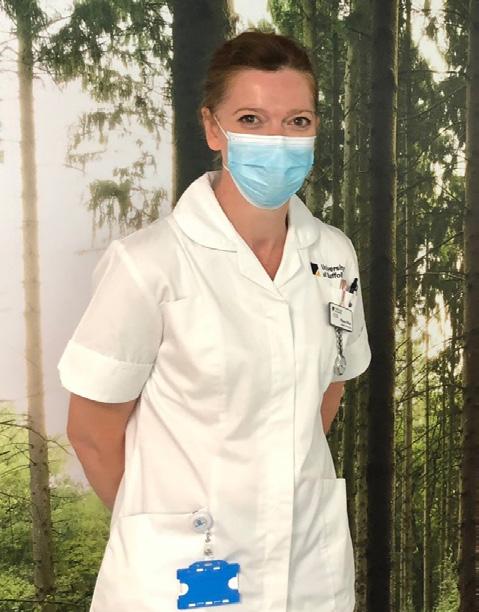
The Coronavirus pandemic came in the middle of Fiona’s studies, but instead of waiting for the pandemic to pass Fiona decided to work as a nursing assistant at West Suffolk Hospital to help staff during the pandemic and learn more on the job. “I am a positive person and have relished the challenge,” Fiona added - “I have used common sense and my training in infection prevention to minimise the risk of COVID-19 to me, my patients and my family as much as possible and have been well supported by West Suffolk with good supplies of PPE.”
“I have also felt privileged to reassure patients when they are at their most anxious and vulnerable in hospital.”
Fiona was shortlisted and recognised by the RCNi Nurse Awards for her extensive research into how student nurses can contribute to improving the care of deteriorating patients. She is now delivering her findings to her fellow adult nursing students.
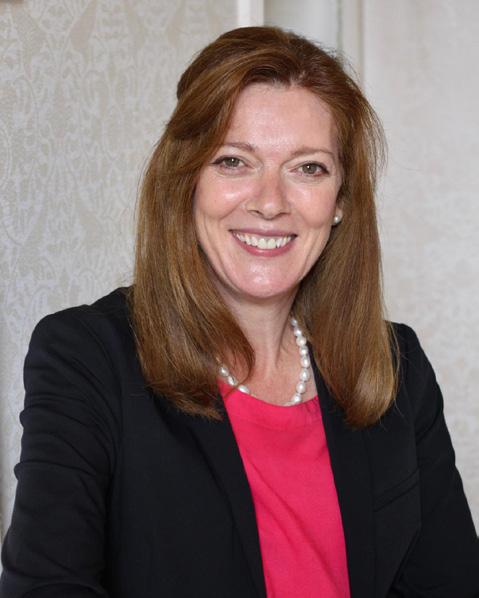
Fiona’s lifelong dream was to become a nurse, but she didn’t have the confidence to pursue it as a career once she left school. Having raised her family and worked as a private secretary, a swimming teacher, and a property developer, Fiona recently took the step to return to education as a mature student to ‘fill the gap’ left in her life once her children had become less dependent on her.
Fiona said “Overcoming the challenge of walking into university open days when I was old enough to be a parent of the students was very difficult. I am pleased to say that since that early experience I have not once looked back, and I cannot wait to qualify as an adult nurse.”
University of Suffolk NEWS Issue 9 2020 Page 11
STUDENT SUCCESSES
Award winning Fine Art graduate
Emily Gillbanks has been named the winner of the Fine Art category in the Artsthread Global Design Graduate Show 2020.
Painted from self-portraits taken on her iPhone, Emily’s piece called More Than Real analyses the immediacy of social media, decontextualising the self from a screen to a gallery space.
Emily has recently started an MA in Painting at the Royal College of Art and was awarded a grant from the international Elizabeth Greenshields Foundation.
Emily said, “The email recognising me internationally as an emerging young artist was quite overwhelming. Especially, to think that people I have never met could show me and my practice such immense support. The Elizabeth Greenshields Foundation has been contributing to the success and development of young representational artists practicing traditional methods from around the world since 1955 (including Jenny Saville after she graduated) and I cannot thank them enough for accepting my paintings.”
“My self-portrait paintings aim to visually reflect my current thinking into how my smartphone has become an extension of both my mind and body. I aim to question how my iPhone, an eminently portable machine, is not only redefining what has historically constituted to what it means to have a body, but also how the world found in our pockets is dominating methods of communication in our current technologically mediated society. I use my paintings to question how we can navigate a horizon of the self in the twenty-first century.”
Find out more about Emily’s work: www.emilygillbanks.com
See last page for pictures from Emily’s show.
Institute of Engineering and Technology — Student of the Year
In 2020, for the first time, the local IET Anglian Coastal group presented an award to the most outstanding engineering and technology graduate from the University of Suffolk.
The recipient of the award, Karina Karushkova, was a model student, not only dedicated to her studies but also doing all that she could to help other students. Karina was a regular participant in course and school committees and achieved a First Class Honours degree in Web and Mobile Development.
Since graduating, Karina has begun her career as a web developer working for the University. She is now responsible for delivering a number of enhancement projects relating to all aspects of the student journey — from enquiry and application, creating new and enhancing existing services, that support and improve administrative processes.
The computing team are immensely proud of Karina and we wish her success in her future endeavours.
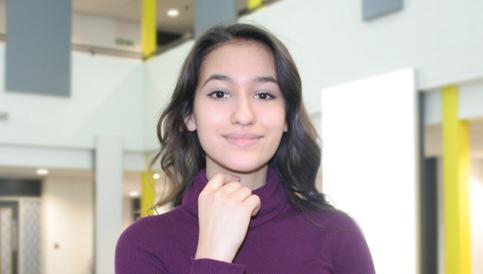
Issue 9 2020 University of Suffolk NEWS Page 12
CORONAVIRUS AND THE UNIVERSITY OF SUFFOLK
Here is just a selection of some of the initiatives and projects we have been involved in over recent months, during the Coronavirus pandemic
Health students and academics supporting the national effort
In March, final year health students were amongst thousands nationally supporting the health and social care system during the Coronavirus crisis.
The Nursing and Midwifery Council allowed students to undertake an extended clinical placement of up to six months to complete the required hours on their course and all outstanding competencies.
Similarly the Health and Care Professions Council (HCPC) for radiographers decided to instigate a temporary register for all third-year students who had completed their practice assessments and were deemed competent to practice.
Initially 65 Adult Nursing students and Child Health Nursing students from the University went into practice along with a group of Operating Department Practitioners (ODPs) and Radiographers. They were joined by many more students in the following weeks and months.
Dean of the School of Health and Sports Sciences and registered nurse, Paul Driscoll-Evans, said in March “This is a great opportunity to make a real difference to the lives of our service users and it presents a great learning opportunity for our students. I am really proud of how dedicated our students have been during this challenging time.”
Dr Ruth Strudwick, Professional Lead for Radiography, added, “Our students quickly
became useful members of the team and were able to assist the radiography staff with imaging both COVID-19 patients and other patients and providing radiotherapy treatment. As a course team we are immensely proud of these students who are now all University of Suffolk graduates and continuing to work as Band 5 radiographers. It was inspiring to see them ‘step up’.”
In April, health academics returned to working in the NHS. Many of the academics in the School of Health and Sports Sciences remain registered health care professionals.
Lecturer in Adult Nursing, Peter Brown, was one of the first to support NHS colleagues during the pandemic working full-time in Critical Care.
Speaking at the time Peter said, “I am currently looking after patients on the Critical Care Unit who are ventilated. The vital and necessary PPE (Personal Protective Equipment) makes things very difficult.”
Peter undertook training to specifically care for COVID-19 patients including new guidance on resuscitation. He added, “I have also attended training at a local trust and have been learning how to manage equipment and technology (ventilators, filters, monitoring) which is different to what I have used in the past. The Critical Care Unit team at Ipswich have been extremely friendly and are grateful for the support and there is recognition that everyone can bring skills from their experiences.”
University of Suffolk NEWS Issue 9 2020 Page 13
CORONAVIRUS AND THE UNIVERSITY OF SUFFOLK
Sustaining learning and teaching through COVID-19
Dr Ellen Buck, Director of Learning and Teaching
COVID-19 has had an unprecedented and previously unimaginable impact on every aspect of our lives. As a University our response to the pandemic has resulted in a reimagining of our approaches to learning and teaching.
As we moved in to lockdown in March, colleagues across the University worked quickly to move as much learning to online as possible. This included reshaping assessments to take place in an online environment, using new tools for delivery, including the Bongo Virtual Classroom and making temporary variations to assessment regulations to ensure that students effected by COVID-19 did not see a negative impact on the final degree awards.
Many readily rose to the challenge of fully online delivery, and looking ahead to academic year 2020-21, the challenge of continuing to deliver high quality learning through the ongoing impact of the pandemic provided an opportunity to capitalize on these new technologies, and the skills and understanding we all developed.
The new academic year sees us delivering our learning and teaching in a blended model. This provides our students with a flexible way
of engaging with learning, able to join campusbased teaching in person, or through live streaming where the impact of COVID-19 on work, caring responsibilities and health and wellbeing makes being on campus impossible.
Course teams have reimagined delivery, created new learning communities across physical and online learning spaces, and provided access to media-rich learning materials and activities designed to scaffold and stretch learning, encouraging our students to explore and enquire. Together with continued access to specialist on-campus facilities and laboratories, work over the last few months has resulted in the University being able to not only sustain delivery, but also to enhance the experience of learning for our students. At the heart of our approach is a student centred commitment to providing an excellent experience.
We will continue to learn through the impact the COVID-19 pandemic has had on our lives, and discover how a truly blended approach to learning and teaching can increase engagement, improve achievement and improve the experience of being a University of Suffolk student.
First ever virtual open event held
In April, the University hosted its first ever virtual open event.
Usually open events at the Ipswich Waterfront campus attract hundreds of potential students from across the UK but due to the Coronavirus outbreak, the University had to rely on digital means to run the event.
Director of External Relations, Polly Bridgman, said, “Due to the Coronavirus outbreak we needed to adapt how potential students can find
out about the University and the virtual open events forms part of that alongside our new virtual campus tour.”
“Since April we have held several virtual events for potential applicants, and I’m pleased to say they have gone well and been well attended from students across the UK and abroad.”
Issue 9 2020 University of Suffolk NEWS Page 14
CORONAVIRUS AND THE UNIVERSITY OF SUFFOLK
We are Together with Business
In May, the University launched the ‘We are Together with Business’ programme — a suite of resources for local and regional businesses to help the recovery from the Coronavirus pandemic.
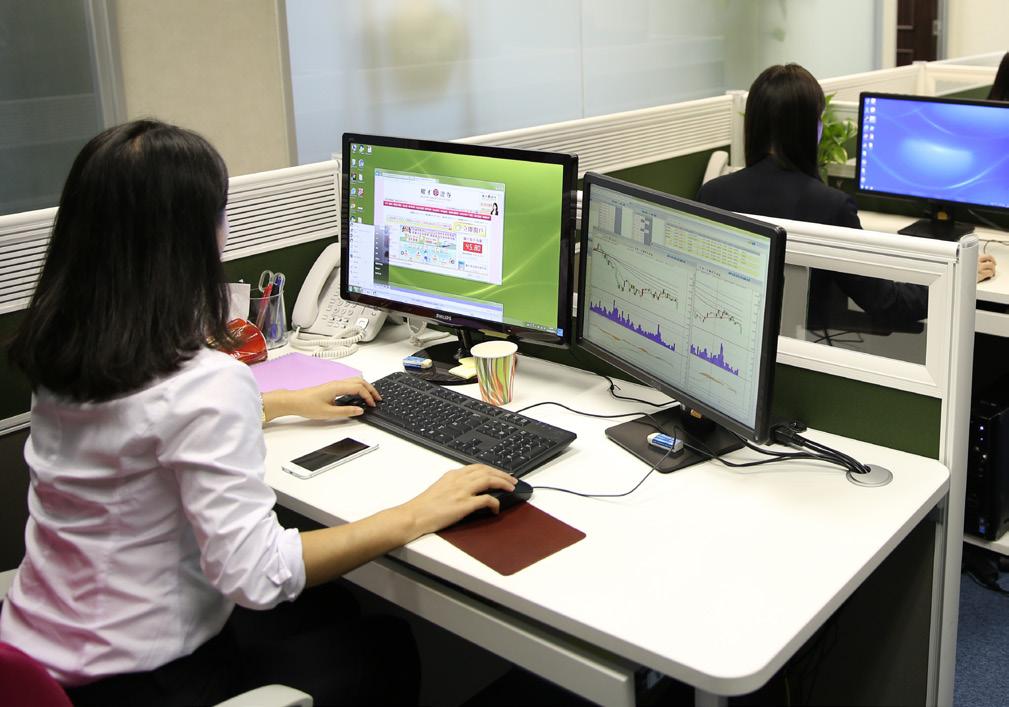
As a rich source of talent and as a community impact university, the University wanted to support businesses to respond, recover and to build their resilience through a knowledge exchange offer.
Several virtual events were available on leadership and management and the University promoted its CPD offer which is continuing to grow.
John Dugmore, Chief Executive of Suffolk Chamber of Commerce, said “Universities provide huge economic benefits to their local areas, residents and of course businesses.
At a time when many businesses may be struggling, the We are Together with Business programme by the University of Suffolk, provides real tangible support and benefits for our business community. Firms of all sizes and sectors can benefit from a wealth of resources, knowledge sharing and several free sessions on leadership and management. This programme by the University shows the real strength of partnership working we have here in the county.”
Find out more about the We are together with Business programme
University of Suffolk NEWS Issue 9 2020 Page 15
CORONAVIRUS AND THE UNIVERSITY OF SUFFOLK
3D Productivity Suite
The 3D Productivity Suite within the Ipswich Waterfront Innovation Centre (IWIC) started to produce visors for healthcare professionals working on the frontline from April.
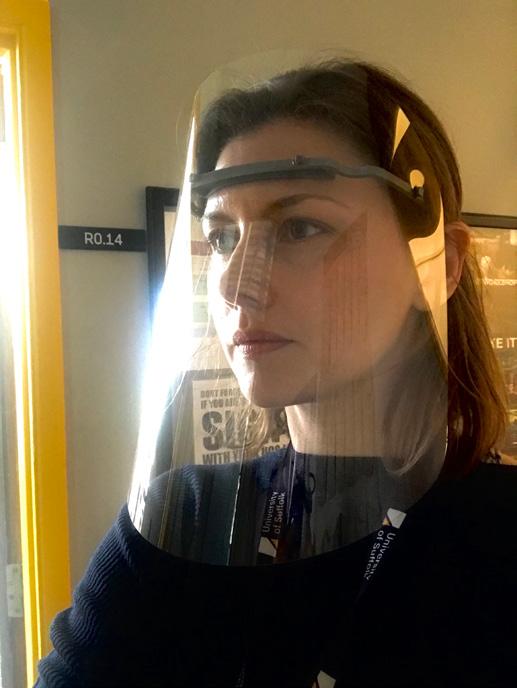
Technicians in the IWIC, printed frames for a variety of healthcare sites across the region including hospitals and GP surgeries.
Danielle Taylor, Technician for 3D Technologies, said at the time, “Like many other companies and institutions in the UK, the University of Suffolk is keen to support our healthcare workers as they look after those who are sick during this pandemic. Our contribution so far has been to produce face shields that will help protect the wearer from airborne droplets that are discharged from a patient when they cough or sneeze. The shields are made from two parts, a clear visor and a headband. The headband is 3D printed in our 3D Productivity Suite on our industrial-grade FDM machine and our two desktop machines. The visor is laser cut from Polycarbonate in our 3D Workshops.”
It is thanks to a capital grant from Ipswich Borough Council, that the University was able to acquire industrial standard 3D printers, which now form the heart of the Productivity Suite.
Ipswich Borough Council Leader David Ellesmere said in April, “It’s great to see a major investment by the Council being put to such a good use. This vital support for healthcare professionals shows how valuable and versatile this advanced 3D printer is. This is a really welcome innovation by the University, and we look forward to seeing these visors get to where they are most needed during the current crisis.”
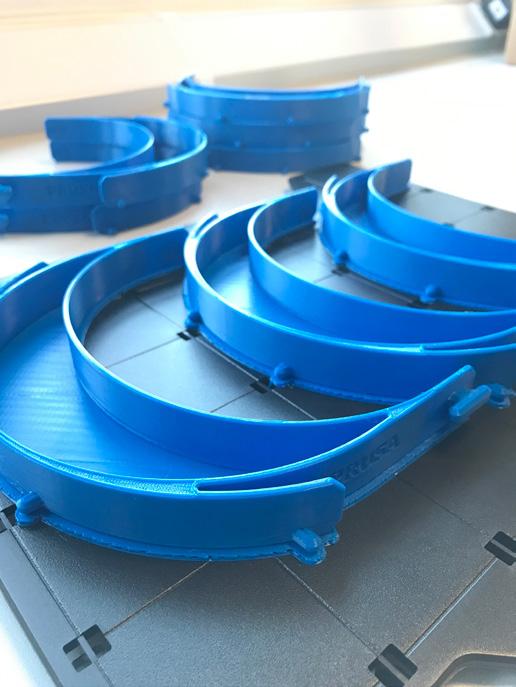
Issue 9 2020 University of Suffolk NEWS Page 16
CORONAVIRUS AND THE UNIVERSITY OF SUFFOLK
Criminology students create distraction packs for prisoners
Criminology students studied how the Coronavirus pandemic affected prisons, with many prisoners spending longer in their cells. This led to the students working with Criminology lecturer, Laura Polley, to create ‘distraction packs’.
Laura said, “As an ex-prison officer myself I recognised the strain my former colleagues were under. When discussing this with students, I framed it as ‘picture being on lockdown in your bathroom, replace the bath with a bed, eating, sleeping and spending 23 hours a day in there. Then add another fully grown person in there. My students understandably empathised with prisoners and I gave them some ideas for how we could help to alleviate some of the strain on prisons using paper-based activities. The term
‘distraction pack’ is used widely in prisons already, however these tend to be puzzle books and stress balls etc. In terms of the reception, it has been fantastic. We have now provided 25 prisons nationally with these resources.”
Laura added “From an academic perspective incell activity packs are crucial during lockdown to ensure the wellbeing of prisoners is maintained. Solitary confinement is really anxiety-inducing so anything that helps alleviate that is useful and can take the pressure off prison officers. At the moment visits have been cancelled and workshops have been closed so prison officers are their only source of support.”
Prisons including HMP Brixton, HMP Stafford, HMP Isle of Wight, HMP Nottingham and HMP Hull have all benefitted from the packs.
App to support communities launched with the help of the University
A new app to support communities during the Coronavirus outbreak was launched in April, with the help of the University.
The TRIBE Volunteer app was rolled out by the ‘Home, But Not Alone’ service. It allows volunteers, charities, town and parish councils, community and religious groups to log their details to offer support, while those in need can request help and the two will be connected via the app.

Professor Nicholas Caldwell, Professor of Information Systems Engineering, explains the University’s role, “Firstly we needed to identify the problems faced by other digital initiatives which had aimed to try and reduce social exclusion. Secondly, we undertook multiple usability and accessibility tests of the app using staff and student volunteers. This highlighted a number of areas where our colleagues at Bronze Software Labs were able to improve the app.”
“Over the course of the project, the TRIBE app became much more usable for people with
limited digital skills and with sight impairments. Sian Cook was our Research Associate on the project and it is with thanks to her and the volunteer testers that we were able to contribute our skills, knowledge and expertise in bringing the app to those who need it.”
TRIBE Volunteer, can be downloaded from the Apple App Store and Google Play Store.
The ‘Home, But Not Alone’ service has been created by partners from Suffolk’s councils, police, health bodies and charitable organisations.
University of Suffolk NEWS Issue 9 2020 Page 17
CORONAVIRUS AND THE UNIVERSITY OF SUFFOLK
Recognition for the University’s response
In October, the University was presented with The Lord Lieutenant of Suffolk Award in recognition of outstanding service to the community in Suffolk during the COVID-19 pandemic.
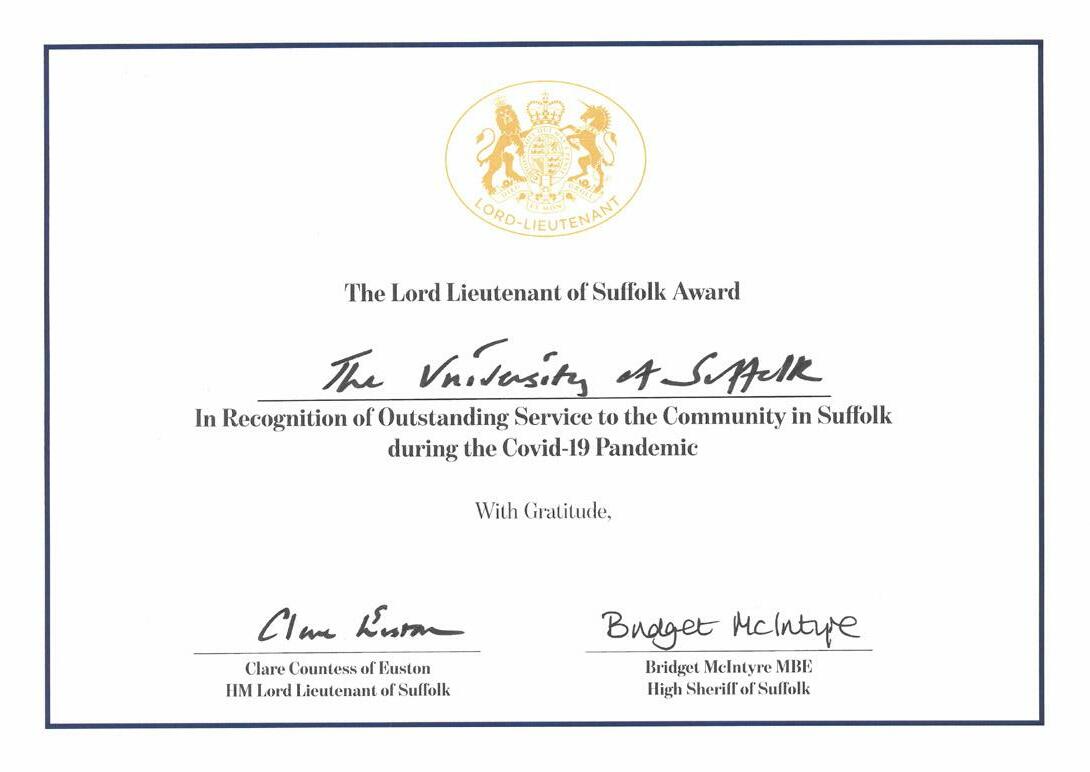
Issue 9 2020 University of Suffolk NEWS Page 18
RESEARCH AND PUBLICATIONS
Policing in the Era of AI and Smart Societies
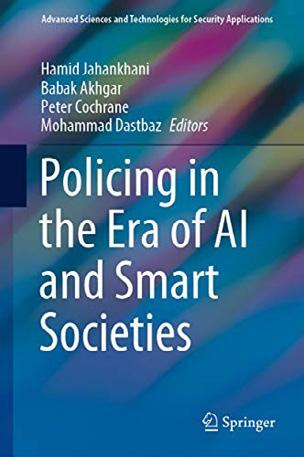 Professor Mohammad Dastbaz Deputy Vice-Chancellor
Professor Mohammad Dastbaz Deputy Vice-Chancellor
This book is a collaboration between University of Suffolk colleagues and colleagues at Northumbria University and Sheffield Hallam. It covers contributions from researchers and practitioners in the fields of policing and cyber criminology, IT law and security, providing a comprehensive overview of current and emerging challenges in law enforcement, AI and Digital Society. It includes chapters by Stuart Agnew, Mark Manning and Professor Emma Bond.
The advent of Artificial Intelligence (AI), together with the spread of Internet of Things (IoT) devices, is creating smart societies that are increasingly interconnected. The scope of connectivity, massive rise in the volume of smart devices and growing interfaces between humans and technology, together with the expansion of Big Data and volumetric metadata generated and collated, are driving the cultural change toward Industry 4.0.
Therefore, in light of do-it-yourself biohackers trying to become cyborgs, Augmented Humanity (fusion between humans and technology), governments’ utilization of the various technologies (example eHealth), holographic communications, smart cities / smart societies, cryptocurrencies etc., in the era of Industry 4.0 with AI at its core, enhancing their policing models has become a priority for governments.
The book also deals with the changing patterns of crime, and how technology is changing in line with smart societies, and how law enforcement agencies around the world are called upon to formulate future-ready legislative frameworks, rethink crime prevention, investigatory decision making and predictive policing, prevent or mitigate potentially devastating cyber-attacks, and ensure the security of operational capabilities, namely: Command, Control, Communications, and Intelligence (C3I).
University of Suffolk NEWS Issue 9 2020 Page 19
RESEARCH AND PUBLICATIONS
Hidden Needs Report
Research looking into the ‘hidden needs’ of those living in Suffolk has been published at the annual celebration event of the Suffolk Community Foundation.
The Foundation commissioned the University to produce the Hidden Needs report which provides the latest vital data and talks about how together we can rebuild local lives in Suffolk.
Professor Emma Bond, Director of Research at the University of Suffolk said “The Hidden Needs Report was a vitally important piece of research when we first became the University of Suffolk in 2016 so we are very pleased that our work with the Suffolk Community Foundation has continued. It is an excellent example of how our research positively impacts on evidencebased policymaking. This third report highlights existing inequalities in our county and stresses the need to work together to overcome these challenges. This report, compiled by my colleague Cristian Dogaru, provides a robust evidence base which we know will be a vital catalyst in addressing particular economic and social issues and prioritising the hidden needs that exist within Suffolk.”
The report was launched at the Suffolk Community Foundation’s annual celebration event which recognised the outstanding contribution of the voluntary sector in Suffolk and reflected on how the sector can best continue to support those in need.
HIDDEN NEEDS
Research and Public Engagement Conference
A conference showcasing the research output by the University took place in March.
Funded by Research England’s Strategic Priorities Fund, the one-day conference brought together academics, policy makers, commissioners, public sector organisations and the voluntary sector.
The conference shared existing innovative research projects undertaken at the University, encouraged academics and wider stakeholders to think about new research opportunities and identified key research challenges faced by the county and how they might be overcome.
Professor Emma Bond, Director of Research, said, “In 2019 Vice-Chancellor Professor Helen
Langton outlined areas of distinctiveness which are the areas or themes which we want the University to be known for. These are health and wellbeing, creative and digital technologies, crime and social justice, history and heritage, sustainability/energy and pedagogy/learning and teaching. The aim of the conference was to showcase our work in each of these areas, especially work in partnership with policy makers where the aim was to better understand local, regional or national challenges. We want our research to lead to developments in evidencebased policy and to make a difference. This mirrors the University’s overarching aim which is to serve the community and to improve lives.”
Issue 9 2020 University of Suffolk NEWS Page 20
Hidden Needs in Suffolk Taking The Long View 2020 | A
Hidden Needs in Suffolk Taking The Long View 2020 University of Suffolk Dr Noel Smith, Independent Research and Consultancy Dr. Cristian Dogaru, Associate Professor, School of Social Sciences and Humanities, University of Suffolk A REPORT TO SUFFOLK COMMUNITY FOUNDATION
The Hidden Needs Report 2020 available online
RESEARCH AND PUBLICATIONS
Augmented Reality and Health
(ARHe project)
Mark Edwards, Associate Professor in Photography Steve Macleod, Visiting Professor of Photography and Manos Georgiadis , Senior Lecturer in Sport and Exercise Psychology
Interdisciplinary research (IDR), can provide different ways of developing and applying knowledge offering holistic solutions to complex problems. It combines knowledge and/or methodological approaches from two or more disciplines to search for or create new knowledge, technology, processes or art. One such opportunity can derive from existing expertise across the academic Schools at the University of Suffolk to develop collaborative projects.
Nature-based therapy has been suggested as a treatment to relieve mental and physical illness and improve recovery time from stressful situations or medical procedures. British Nature, World Health Organization and the Government’s own white paper has linked stimuli associated with natural environment, including sounds or images, as having a positive effect on people’s mental and physical well-being and recovery from illness and surgery.
Research also indicates that those who live close to such spaces, have greater access to them, or views of them, have lower rates of psychosis, depression, anxiety and anger.
Previous studies suggest that exposure to such spaces improves cognitive functioning and reduces anxiety for people suffering from ADHD, depression and dementia; can provide moderate to strong pain relief; improve patients’ post-surgery rehabilitation; and reduce hospitalisation days. In addition to patients, nursing staff also felt less stressed when exposed to a green environment.
Similarly, the application of Slow Breathing (SB) has also been found to be beneficial for enhancing emotional control and psychological wellbeing in healthy subjects with objective clues derived by the improved balance of the Autonomic Nervous System (measured by Heart Rate Variability (HRV)), and brain functions (estimated via Electroencephalography metrics). Modern technology solutions and augmented reality can make the application of SB easier to learn and apply in everyday life, supporting improved psychological states.
The aim of this interdisciplinary research project is to utilise creative digital technologies across art and design, computer games, psychology, humanities and health programmes, to work on a project that explores creating virtual green and blue sensory spaces for those that live in urban environments, or their physical/mental condition prevents them from accessing them. This collaborative approach could make an innovative contribution to the current research on the correlation between mental and physical wellbeing and green and blue spaces. Various population segments could be benefited from such technology applications and we are aiming to prioritise our participants based on relevant interdisciplinary explorations and pertinent funding opportunities.
Initial interest in the project has been expressed already from the well-established business Beloudest, the virtual reality artist Jane Gauntlett, and the charity organisation Hospital Rooms
University of Suffolk NEWS Issue 9 2020 Page 21
ARTICLES FROM EARLIER THIS YEAR
Due to the pandemic we were unable to publish the newsletter in the spring, therefore please find on the following pages the content from earlier this year.
An increase in applications shows the impact of the University’s widening participation work
At the 15 January UCAS deadline, applications from target schools in Suffolk were up by 12%.
The increase has been attributed to the impact of the work of the Suffolk team of a project called Take Your Place, run by the Network for East Anglian Collaborative Outreach partnership (neaco).
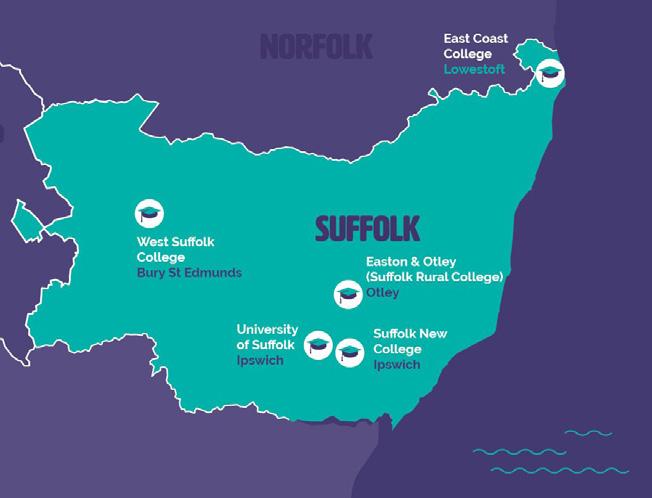
The project aims to help young people from East Anglia with little or no experience of university to explore the world of higher education.
Neaco works with students in years 9-13 living in areas identified by the Government with low rates of progression to higher education.
Higher Education Champions, who are based in schools and colleges across the region, run activities and are on hand to advise students about going to university.
Miles Cole who oversees neaco for the University of Suffolk, said, “We are really pleased to see the impact Take Your Place has had. We know anecdotally that many of the students we work with were planning to apply to university, and to the University of Suffolk, so it is good to see this being the case in the latest figures. The University of Suffolk is a community impact university and its aim is to raise aspirations and encourage participation in higher education. This mirrors the aims and ambitions of neaco. Through our work, we are increasing the number of first-generation students and helping them to explore options they may have otherwise thought weren’t possible for them.”
The Suffolk team of Take Your Place consists of 11 Higher Education Champions. Up to July 2019 the team delivered 3,500 activities and worked with 24,500 students from 50 schools and colleges with each student participating in more than four activities.
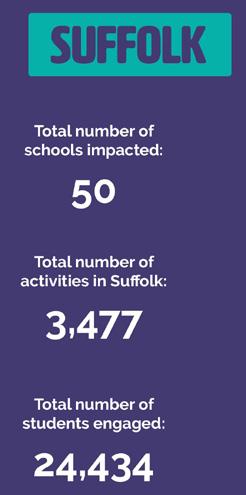
Issue 9 2020 University of Suffolk NEWS Page 22
ARTICLES FROM EARLIER THIS YEAR
Q&A with Professor Gurpreet Jagpal, the
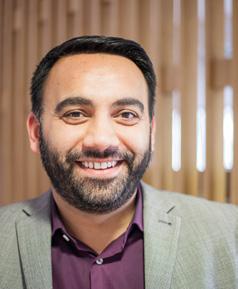
recently appointed Pro Vice-Chancellor for Business Engagement and Entrepreneurship
Tell us about your background?
I have spent the last 16 years working in various universities across the UK – Birmingham City, Birmingham, UCL, London South Bank and more recently UWE. My roles have predominantly focused on building relationships between university and business (knowledge exchange), enterprise and entrepreneurship (skills and start ups) and supporting academic research (REF).
Outside of the university environment, I own a small property portfolio, a share of an educational software development company and I have recently taken a Director position with a training company.
I’ve been married for nearly 13 years to Kam and we have a beautiful (and energetic) son – Amar! All 3 of us love travelling.
Why did you choose to work at the University of Suffolk?
I am delighted to be joining the University of Suffolk at such an exciting time. The University’s focus on community impact, business engagement and transforming the educational lives of the communities we serve really resonates with my own beliefs on the role of universities as catalysts for change. I am committed to bridging the gap between the
The quick fire round
Tea or coffee?
Coffee Cat or dog?
Neither, fish
Football or rugby?
Neither, tennis
Summer or winter?
Winter Sweet or savoury?
Sweet
worlds of education and business and look forward to working with University of Suffolk staff, students and alumni, along with the local community and businesses, to achieve this.
What are your impressions of Suffolk as a county?
So far, I have spent just under a week in Ipswich and explored as much as I can. Over this weekend, Kam and Amar joined me, and to quote Amar “I love Suffolk” – and I certainly do agree. Over the coming months I hope to enjoy some of the scenic villages, countryside walks and picturesque views.
What will be your focus for your first few months in the role?
I’m really looking forward to joining on the 20th April and will spend the first few months getting to know the team and wider university – if there’s not something already scheduled please do get in touch to arrange a time to meet over coffee. I’m also looking forward to getting to know the external community and understanding how we, as a university, can more strongly support their work and help them in achieving their goals and ambitions.
Instagram or Twitter?–
Both: Instagram @profgupsjagpal and Twitter @gupsjagpal Boxset or cinema?
Boxset Staycation or vacation? Vacation Cake or biscuit? Cake (coffee)
Soap or sitcom? Sitcom Describe yourself in three words: Friendly, ambitious, positive
University of Suffolk NEWS Issue 9 2020 Page 23
ARTICLES FROM EARLIER THIS YEAR
Ed Sheeran: Made in Suffolk educational workshops
Ed Sheeran’s photographer, Mark Surridge, has hosted two workshops as part of the Ed Sheeran: Made in Suffolk exhibition. The exhibition at Christchurch Mansion is curated by John Sheeran and Wolsey Gallery curator Emma Roodhouse and it features Mark Surridge’s work.
A group of Photography and Fine Art students from the University of Suffolk took part in a masterclass.

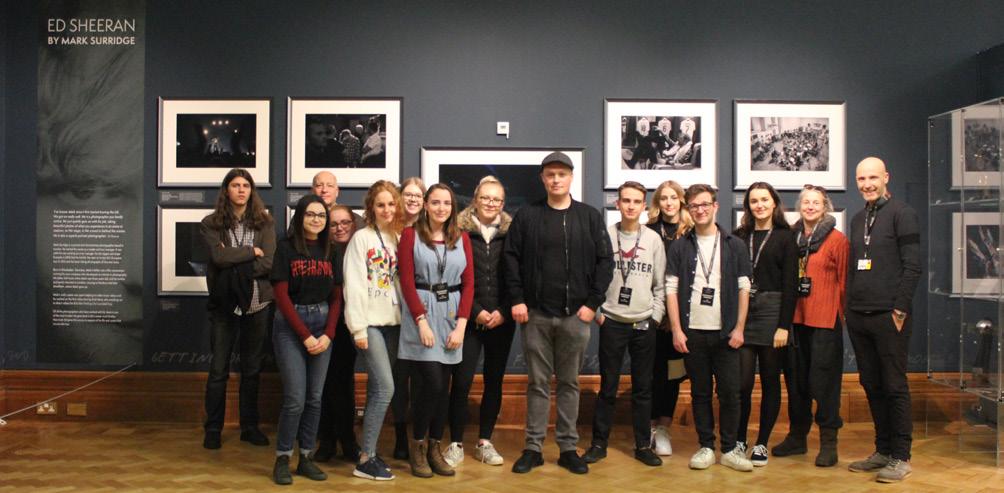
Ed Sheeran, who is an honorary doctorate of the University, said of the educational workshops, “I am happy that the exhibition has exciting creative activities for young people, including portrait painting, photography, song-writing and music workshops.”
The group from the University included final year Photography student Lauren Vince who said, “It has been a fantastic event. It’s been really interesting to hear the stories of how the photographs by Mark Surridge were taken and what happened behind the scenes. I think it’s really helpful for us students to hear how photographers have made their way into the professional world. We’ve spoken to several photographers throughout our degree and it’s
interesting to see how everyone’s achieved success through different paths.”
A group of Year 12 students from across East Anglia also took part in a separate workshop with Mark at both Christchurch Mansion and the University. The students explored the theme of identity and sense of place and edited their work using the newly refurbished Photography studios at the University.
p An example of student work
16-year-old Jacob Staddon attends Northgate High School. He said, “The workshop was really interesting. I’d like to go into photography as a career so today was really inspirational. It showed me that what I’d like to do is possible and something I can work towards. Mark is really down to earth and relatable.”
Issue 9 2020 University of Suffolk NEWS Page 24
ARTICLES FROM EARLIER THIS YEAR
2020 Keio Study Programme
We were once again delighted that five students from the School of Health and Sports Sciences were able to attend the ‘Challenge for an Ageing Society as a Global Health issue and the Role of Nurses’ programme hosted by Keio University in Japan in February. The students were from three programmes within the School and across different cohorts:
Bethany Jacklin
2nd year Mental Health student
Harriet Hopkins 3rd year Mental Health student
Lorna Macleod
1st year Mental Health student
Sam Bolger
2nd year Child Health Nursing student
Sarah Addy 1st year Adult Nursing student
The students and their counterparts from universities in Korea and America spent five days alongside 20 students from Keio University, experiencing theory and nursing practice in Japan in both hospital and community settings
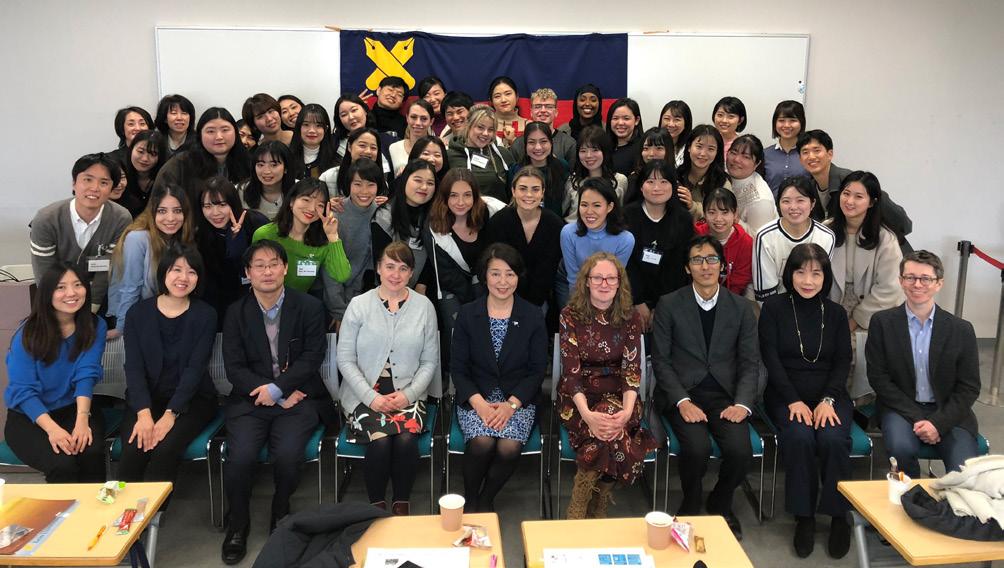
and learnt first-hand how this differs from provision in other countries.
This year, Heather Rugg, Course Leader for Mental Health Nursing, and Mary Carter, Course Leader for Adult Nursing, were invited to lecture on ‘Team Activities by Inter-professional Work’ to Keio students who are majoring in medicine, nursing, and pharmacy as they prepare for their primary care fieldwork trip to Laos. Heather also held a Q&A session for Home Nurses in the Community on ‘Dementia Care’.
Both Mary and Heather were on hand to provide support to our students during their study tour, as well as taking the opportunity to meet their counterparts from Keio University.
There will be a reciprocal study tour in September 2020 when the School will be hosting both students and staff from Keio. Students from the 2019 and 2020 Keio tours are eagerly looking forward to meeting some of the new friends they have made during their time in Japan.
University of Suffolk NEWS Issue 9 2020 Page 25
ARTICLES FROM EARLIER THIS YEAR
Events and Tourism students visit Spain
By Jay Harvey, Senior Lecturer, Suffolk Business School
Sixteen students enjoyed the recent cultural trip to Valencia with activities ranging from guided tours of ‘The City of Arts and Sciences’ to visiting the famous Hemisferic and the Oceanografic which included observation of fish through glass tunnels and watching dolphins, with great enthusiasm.
The trip finished with a Gincana involving students participating as a group on a Treasure Hunt where they had to prove they visited attractions by posting on Instagram #UoSEventTourism and collecting ‘likes’.
A big thanks to Gloria for her sterling work in organising and looking after the students.
Some student feedback:
I was SO close to backing out of this trip (due to anxiety/feeling uncomfortable etc.) but it honestly has been worth venturing outside of my comfort zone because I’ve got to explore the most beautiful city and to create friendships/memories with new people.
I really enjoyed the trip, I had a chance to put my Spanish to use and the food and drinks were amazing. So much culture. I enjoyed it so much being with everyone and seeing everything and would love to go back.
It was an amazing journey to go there with the people from my course. I mostly enjoyed the day at the Museum, Oceanografic and of course the dolphins! Thank you so much for that chance to explore a different culture. I hope it will be possible again.
Biomedical Science accreditation
The School of Engineering, Arts, Science and Technology (EAST) are pleased to announce that the new BSc (Hons) Biomedical Science degree has received accreditation by the Institute of Biomedical Science (IBMS). This is the leading UK professional body for scientists, supporting staff and students in the field of biomedical science.
This is the first professional accreditation within the School of EAST. The accreditation enhances students’ employment opportunities as it is a prerequisite for their statutory registration as biomedical scientists with the Health and Care Profession Council, without which they cannot practice as a Biomedical Scientist.
The course leader Dr Aida Rajic, who led the degree validation and accreditation, said, “The establishment of the IBMS accredited Biomedical Science degree here at the University has been part of the ongoing vision
for a number of years. With this course, we aim to provide opportunities to the local community to gain new high-skilled professional qualifications.”
The qualification is in high demand due to a long-term shortage in skilled professional biomedical scientists within the local and national hospitals. We are grateful to our collaborators from East Suffolk and North Essex NHS Foundation Trust and North East Essex and Suffolk Pathology Services. They were involved with the design of the course from its inception ensuring that it meets industry requirements.
This programme makes excellent use of the skills and resources within the School; in particular, the high specification laboratories in the James Hehir Building provide an excellent learning environment to develop the skills necessary to become an industry-ready biomedical scientist.
Issue 9 2020 University of Suffolk NEWS Page 26
ARTICLES FROM EARLIER THIS YEAR
AWS Academy —

equipping students
for careers in cloud computing
The University has announced its participation in AWS Academy, an Amazon Web Services (AWS) programme that helps prepare students to meet the high demand for cloud computing skills in the UK.
The School of Engineering, Arts, Science and Technology (EAST) will begin delivering the AWS Academy curriculum to students enrolled on a range of computing degrees this semester. The skills the students gain through this programme will prepare them to pursue careers in one of the fastest-growing technology sectors.
The University’s AWS Academy accredited educators, Professor Nicholas Caldwell and Sean Preston, hope this development will lead to further opportunities for both students and local businesses to gain industry-recognised AWS Certifications.
Professor Caldwell, Associate Dean for Business Engagement in the School, said, “As part of our commitment to the employability of our graduates, we are very pleased to make the AWS Academy curriculum available to our students and provide them with the opportunity to explore AWS as an integrated part of their degrees. The rapid rise of cloud computing is transforming how organisations create business value and generate a growing number of new high-quality jobs in the UK and around the world. The technical knowledge and hands-on skills that students develop through this programme will position them well for their careers today and in the future.”
AWS Academy Team Lead, Scott McKinley, said, “IT professionals with cloud skills are in high demand, and we’re proud to help advance training and learning opportunities for students at the University of Suffolk. With AWS Academy, students will be equipped with the practical skills they need to add value in their first cloud role.”
Students currently enrolled on BSc (Hons) Web and Mobile Development, BSc (Hons) Digital and Technology Solutions, BSc (Hons) Software Engineering, BSc (Hons) Software Engineering (progression route) and BSc (Hons) Computing and Business Management will have access to the AWS Academy curriculum.
University of Suffolk NEWS Issue 9 2020 Page 27
Award winning Fine Art graduate

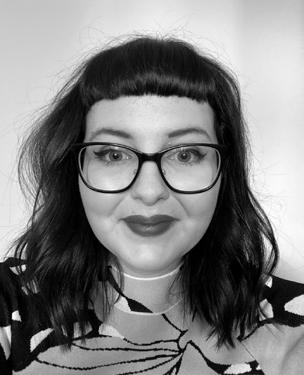
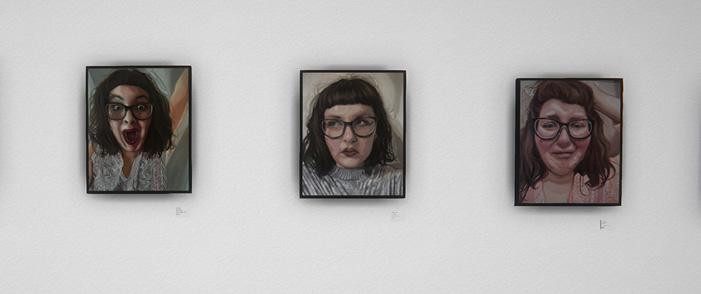

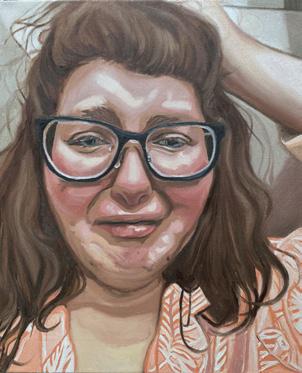
OVER TO YOU
We want this newsletter to be a reflection of all of the excellent projects, research and work being undertaken by our staff.
If you have any feedback and suggestions for content please get in touch by emailing Atlanta Blair at atlanta.blair@uos.ac.uk
Thank you.
Issue 9 2020 University of Suffolk NEWS Page 28
Emily Gillbanks has been named the winner of the Fine Art category in the Artsthread Global Design Graduate Show 2020. Full item is on page 11.





















 Professor Mohammad Dastbaz Deputy Vice-Chancellor
Professor Mohammad Dastbaz Deputy Vice-Chancellor











